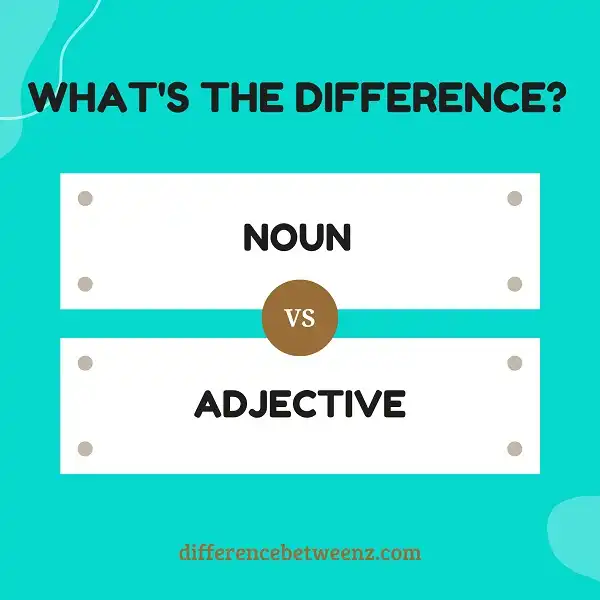A noun is a part of speech that denotes a person, place, thing, or idea. An adjective is a word that modifies the meaning of a noun or pronoun. In English, there are three degrees of comparison for adjectives: positive, comparative, and superlative. In this blog post, we will discuss the difference between nouns and adjectives with examples. Stay tuned!
What is Noun?
A noun is a word that refers to a thing, an object, or a concept. Nouns can be both concrete and abstract. Concrete nouns are physical objects, while abstract nouns are ideas or concepts. Nouns can also be classified according to whether they are countable or uncountable. Countable nouns can be quantified, while uncountable nouns cannot. For example, the word “chair” is a countable noun because you can say “there is one chair,” “there are two chairs,” etc.
The word “furniture,” on the other hand, is an uncountable noun because you cannot say “there is one furniture.” Nouns can also be either proper or common. Proper nouns refer to specific people, places, or things, while common nouns do not. For example, the word “Barack Obama” is a proper noun because it refers to a specific person. The word “president,” on the other hand, is a common noun because it refers to a general concept. In summary, a noun is a word that refers to a thing, an object, or a concept.
What is an Adjective?
Adjectives are words that modify nouns or pronouns. They can express a variety of qualities, such as size, shape, color, and emotional state. Adjectives can also be used to express quantity, such as “few” or “many.” In English, adjectives usually come before the nouns they modify, as in the sentence “the red apple.” However, they can also come after certain verbs, such as “be” or “seem,” as in the sentence “the apple seems red.”
Adjectives can also be used to form adjective phrases and adjective clauses. Adjective phrases modify nouns or pronouns and usually come after the noun or pronoun they modify. Adjective clauses also modify nouns and pronouns, but they act like miniature sentences, containing both a subject and a verb. Adjective clauses are often introduced by relative pronouns such as “who,” “that,” and “which.”
Difference between Noun and Adjective
Nouns and Adjectives are words that are used to describe a person, thing, place, or idea. Nouns are words that refer to a specific person, place, thing, or idea. For example, “dog,” “table,” and “Boston” are all nouns. Adjectives are words that modify nouns. They can describe the Nouns: size, shape, color, age, etc. For example, in the sentence “the big dog,” the adjective “big” modifies the noun “dog.”
In the sentence “the old table,” the adjective “old” modifies the noun “table.” Finally, in the sentence “the beautiful city of Boston,” the adjective “beautiful” modifies both the noun “city” and the noun “Boston.” Nouns and Adjectives are both important parts of speech, and they can be used together to create interesting and descriptive sentences.
Conclusion
In order to make sure you are using the correct word in your writing, it is important to understand the difference between a noun and an adjective. A noun is a person, place, or thing, while an adjective modifies or describes a noun. Adjectives can be used to change the meaning of a sentence, for example by making it more positive or negative. By understanding the differences between these two types of words, you can ensure that your writing is accurate and precise.


